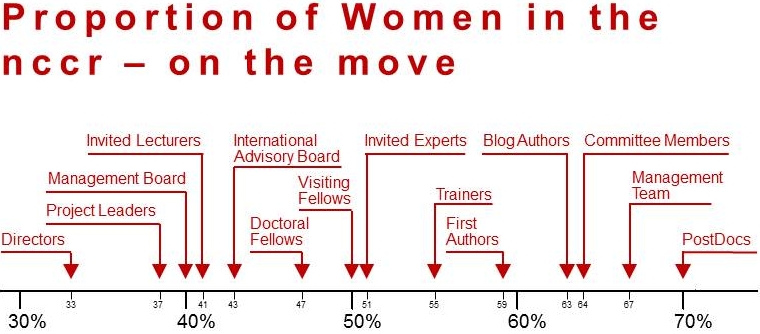An nccr – on the move: Not Without Us

In this contribution to the Blog Series “Gender, Skills, Migration” we assess the performance of the nccr – on the move in realizing one of its strategical goals, namely the equal opportunities of its members. Some partial goals, such as gender balance and increased sensitivity, have been achieved, but at the same time complex research networks such as ours bear other possible sources of inequality.
Gender balance within the organization is one of the aspects on which all NCCRs must regularly report to the Swiss National Science Foundation (SNSF). A key indicator is the monitoring of the gender composition of the NCCR Community. At the time of writing, women are under-represented at the level of the Project Leaders (approximately 40%), while they are the majority at the PostDoc level (approximately 70%). At the level of the doctoral students we have witnessed a change with a slight majority of men in Phase II (53%), while Phase I was characterized by a majority of female doctoral students.
In our understanding, the gender composition in our Community is only one indicator of gender balance, which is why we have decided to carry out a more comprehensive monitoring. For this blog post, we have asked our Data Manager, Andreas Perret, to visualize some of this information on gender balance in the governance structure as well as in the areas of research, knowledge transfer and education. In what follows, we are commenting on some of the figures.

Gender Balance in the Governance Structure
The decisions related to all areas of activity of this NCCR are taken by a governance structure. The nccr – on the move Director and Deputy Director continue to be men, while the Administrative Director is a woman. They are supported by a predominantly female management team, composed of four women and two men. The Directors are part of the Management Board, as well as the Chairs of the Scientific Committee (a man), the Equal Opportunities and Education Committee (a man) and the Knowledge Transfer and Communication Committee (a woman).
The nccr – on the move’s governance structure is thus operational thanks to the (not always visible) work of the fourteen women and eight men who compose them. In the key decision-making bodies, the Management Board (3:2) and the Scientific Committee (5:3), women are in a minority, while in the Committees responsible for knowledge transfer/communication (3:5) and education/equal opportunities (2:5), women make up the majority. To summarize, women are nowadays better represented in our (and other) NCCR’s governance, but we have as yet not achieved an equal gender representation at the level of the scientific and research leadership.
Gender Balance in the nccr – on the move’s Activities
The first most visible result of the scientific work conducted in an NCCR are publications. A first remarkable observation is that 59% of all nccr – on the move publications had a female first author and 47% had a female second author which mirrors the overall gender composition of the NCCR community. The work of our female members is therefore highly visible and present in the scientific debate.
Additionally, the nccr – on the move has put in place a number of other scientific activities. Among these activities, the Public Lecture Series serve to invite scholars to present and discuss their work with our fellows. By regularly inviting female scholars, we provide our fellows with the opportunity to meet and network with (female) scientists from different countries who may act as role models at the same time. Overall, 41% of invited speakers to our public lectures were female – a steadily increasing number.
Second, for the last two and a half years we have been administering a scheme for short-term incoming or outgoing visiting fellowships, complementing the SNSF Mobility Grants, which are used to finance longer stays. In terms of gender equality, half of our visiting fellows were female.
Last but not least, the nccr – on the move has an International Advisory Board of renowned scholars in the area of migration and mobility studies. Although we have not achieved our parity goal in the board, there has been an increase in the number of female scholars in the transition from Phase I to Phase II and six of the fourteen members are currently women.
To sum up, female scientists are well represented in the different scientific activities, but they are even more present in the areas of education and communication/knowledge transfer. In this vein, we would highlight that 55% of our facilitators for academic and transversal skills workshops are women, 50% of the experts invited to our transfer knowledge events have been female and almost two thirds of our blog authors are women.
It seems to us that the figures we have just offered show an arising awareness for equal opportunities and gender sensitivity in the NCCR. At the same time it is apparent that, although the gender proportions in the doctoral and postdoctoral phases defy the usual distribution in Swiss academia in our NCCR (BFS 2019), we have not achieved an equal gender representation at the level of research leadership and of the key bodies in governance. By contrast, the less visible areas of knowledge transfer, communication and training, depend heavily on the input of female members.
Academic Housekeeping – the Work that We Cannot See
The previous overview of the governance structure and activities of the NCCR reveals yet another relevant aspect to take into account in any discussion about equal opportunities: complex research structures, such as NCCRs, are strong in creating additional community service work. Empirical evidence has confirmed that female researchers perform, on average, more of this uncompensated service work as well as supervision duties in their research centers (Guarino 2017, Torres Menárguez 2019). In the most recent literature this type of work has been named academic housekeeping.
The question of whether this academic housekeeping work is detrimental for female careers does not have a simple answer. It is clear that committees and working groups are essential structures to guarantee the good functioning of large-scale research networks. On the one hand, this hardly visible work is time-consuming, and is furthermore not regarded as an academic merit in appointment procedures. It has moreover been observed that the committee work often reproduces gendered hierarchies. On the other hand, academic housekeeping does not only imply cumbersome chores, such as a report writing, project members briefing or minutes taking. In a platform like an NCCR, it also means exercising internal academic diplomacy aimed at reconciling the often conflicting viewpoints of network members.
Academic housekeeping may thus constitute an opportunity for female researchers, rather than a threat if it gains visibility in the academic world. For example, experience shows that female and male professors frequently have a divergent understanding of what student supervision implies. By discussing these issues and introducing supervision standards and best practice catalogues in communities of researchers, supervision work is made visible and recognized. The discussion provides as well the basis for a more equal distribution of supervision work between the female and male members of a research community. In conclusion, two further goals of large-scale research structures, such as the nccr – on the move, should be to make invisible service work more visible in the academic world, and to advocate for a more equal distribution of this work, a distribution that does not readmit gender stereotypes through the back door.
Nicole Wichmann is the Administrative Director of the nccr – on the move. She holds a doctorate in political science from the University of Lucerne. She previously worked as project coordinator at the Swiss Forum for Migration and Population Studies at the University of Neuchâtel where she conducted studies on immigrant integration, human rights of migrants, removal policies and federalism.
Raquel Delgado Moreira is the current Education, Careers and Equal Opportunities Officer of the nccr – on the move. Trained as a philosopher and a historian of science, she has doctorated, published and taught in the (very masculine) European history of natural philosophy in the 17th century, while at Imperial College London and ETH. She stepped out of academia after her postdoctoral phase and has held different non-academic positions ever since.
References:
– Bundesamt für Statistik (BFS), 15. Bildung und Wissenschaft. In der Schweiz und in Europa bleibt die Forschung weitgehen eine Männerdomäne, March 2019.
– Guarino, Cassandra M. et al. (2017). Faculty Service Loads and Gender: Are Women Taking Care of the Academic Family?, Research in Higher Education 58(6), 672-694.
– Torres Menárguez, Ana. La trampa del “trabajo doméstico” universitario lastra la Carrera de las profesoras, El País, 14 June 2019.


